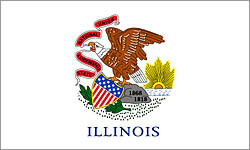
Illinois will recieve federal economic stimulus over the next two years. This article outlines the funding and opportunities the American Recovery and Reinvestment Act will provide Illinoisians.
How the Federal Economic Stimulus Will Be Allocated in Illinois
The federal Recovery Act will invest in various sectors throughout Illinois including education, infrastructure, energy, health care, and public safety.
People, Work, and Opportunity

The American Recovery and Reinvestment Act of 2009 (ARRA) provides significant financial assistance to workers and families hit hard by the economic crisis.
In Illinois, a variety of human services programs stand to benefit from this additional funding, including a one-time emergency payment to Social Security, Supplemental Security Income, and other compensation or pension benefit recipients; additional unimployment compensation; reductions by 65% in the cost of COBRA and other state group continuation coverage for workers who lose their jobs; an increase in funds for the Temporary Assistance for Needy Families (TANF) program and the Supplemental Nutrition Assistance Program (SNAP - formerly the Food Stamp program); the Women, Infants, and Children (WIC) program; and others.
The Recovery Act also repeals cuts to child support enforcement funding through September 30, 2010. Illinois' estimated portion of funds for the child support enforcement program for 2009 is $18.6 million and for 2010 is $19.5 million. An additional $10.8 million in performance incentive was awarded for 2007.
Education

Federal stimulus dedicates $53 billion to education and training, including K-12, higher education, and job training programs.
Illinois students and families can take advantage of the $15.6 billion in additional funding for the Federal Pell Grant Program by completing the Free Application for Federal Student Aid (FAFSA).
The federal stimulus package could provide up to $3 billion in education funding for Illinois schools, with nearly $1 billion in additional funding for several existing operations and programs, including Title I grants for low-income populations, special education programs and educational technology. Illinois is also eligible to apply for up to $2 billion under the Stabilization Fund.
Energy & Environment

The Recovery Act appropriates $43 billion for investments in energy, including the Weatherization Assistance Program (WAP); repair of federal buildings to increase energy efficiency; fossil energy research and development; research in renewable energy; programs in alternative fuels, smart and energy efficient appliances; and modernization of the electric grid.
Illinois will receive approximately $260 million from the Department of Energy Weatherization Program, where up to 20% of the weatherization program funds can be used for training and technical assistance.
The Illinois Home Weatherization Assistance Program (IHWAP) enables low-income families to permanently reduce their energy bills by with services such as sealing cracks, insulating attics and walls, repairing and replacing windows and doors, and repairing and cleaning heating systems.
Federal stimulus includes significant funding for two State Revolving Fund (SRF) loan programs currently administered by the IEPA. The Water Pollution Control Loan Program (WPCLP) will provide approximately $177.2 million in assistance for wastewater projects. And the Public Water Supply Loan Program (PWSLP) will provide approximately $79.5 million in assistance for drinking water projects.
The Recovery Act also provides billions of dollars to states to clean up former weapon production and energy research sites; improve local water infrastructure and waste disposal facilities; and fund environmental cleanup programs such as Superfund. The funding for many of these projects will flow through existing programs administered by the Illinois Environmental Protection Agency (IEPA) and the Illinois Department of Commerce and Economic Opportunity (DCEO).
Health Care

The Recovery Act dedicates $59 billion to investments and improvements in health care, including funding for cancer, Alzheimer's, heart disease and stem cell research; interoperable health information technology; prevention and wellness programs; and the improvement of National Institutes of Health (NIH) facilities.
The Medicaid federal match rate (FMAP - Federal Medical Assistance Percentage) is increased from its current 50.32% to 60.48% for nine federal fiscal quarters, dating back to October 1, 2008. Overall, the FMAP increases allow for an estimated $2.9 billion in extra federal Medicaid funds to Illinois over a 27-month period. Of this, about $2.6 billion will result from spending by state agencies, and the remainder from spending by local Medicaid providers.
Infrastructure

Federal stimulus funds provides appropriations for a variety of infrastructure improvements, including broadband access and usage; airport and border security; VA hospitals and medical facilities; Department of Defense facilities; and highway, air, and rail transportation systems.
$48 billion is available nationwide for transportation infrastructure covering all modes - highways and bridges, public transportation, passenger and freight rail and airports. To meet the Recovery Act's goal of stimulating the economy by putting people to work - the Illinois Department of Transportation (IDOT) has initiated a process that will allow work to begin in late May or early June of 2009.
In order to access the first half of the highway stimulus funds coming to Illinois, IDOT has identified projects that can be awarded quickly to put people to work in the construction industry. IDOT engineers have identified approximately $693 million in projects that are "shovel ready" and can be on a special letting in early April, 2009.
Additionally, the Recovery Act includes $7.2 billion for competitive grant and loan opportunities aimed at expanding broadband access in underserved and unserved areas. $4.7 billion will go through the U.S. Department of Commerce, and $2.5 billion will pass through the U.S. Department of Agriculture.
Public Safety

The Recovery Act includes more than $4 billion nationally for state and local law enforcement and other criminal and juvenile justice activities. The U.S. Office of Justice Programs (OJP) which provides federal leadership in developing the nation's capacity to prevent and control crime, administering justice, and assisting victims, is the lead agency for this funding, and works directly with the Illinois Criminal Justice Information Authority to administer grants in Illinois.
These grants will protect the most vulnerable and victimized of our society by funding law enforcement, prevention and education, drug treatment programs, and support services and advocacy groups for victims of crime and domestic violence.
Recovery Act Funding Opportunities in Illinois
Funding from the federal Recovery Act creates opportunities for state contracts, jobs, and grants. Each of these categories is linked to Illinois State programs and departments where you can receive information, apply for funding, or submit proposals.
Related Articles
- Obama's Loan Modification Plan Explained
- Stimulus Plan 2009 - What's In it For You
- 2009 Economic Stimulus Package Explained
- 2009 Economic Stimulus Plans-A Glossary of Terms
- Executive Summary of the 2009 Economic Stimulus Plan
- Obama Stimulus Plan FAQ
 Print
Print Email
Email







